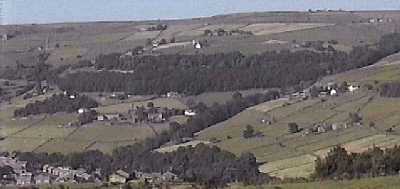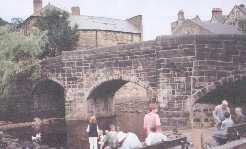|
|

Murgatroyd lies in the wooded area, center-top, known nowdays as Hollins wood. Two cinerary urns were found while digging foundations for a barn, also three silver Roman coins, a Vespasian and two Hadreans. |
Moor-gat-royd
is on the Southern slopes
of Highroad Well Moor, with a good aspect to the midday
sun.
Since the days of King Edward III, a building has existed on this spot, and for more than five hundred years was in the possession of the two families of Murgatroyd and Dearden. We find in 1371 a John de Moregatrode, and later in 1432 a John Murgatroyd of Murgatroyd, mentioned in ancient records, and this house appears to have remained in the possession of the family until 1677. From this there appears little doubt either about the origin of the name or the birthplace of the family. Although the earliest mention found of the name is in 1371, in the court rolls of the Manor of Wakefield, when John de Moregaterode was Constable of the township of Warley in the 45th year of Edward the III, there is reason to believe that the land of Moregatrode is of much earlier date than this, as it is known that its surroundings are of great antiquity. |
|||||||||||||||||||||||||||||||||||||||||||
|
The spelling of the name varies considerably as schollars in those times used French,Latin and English interchangeably. |
In the Poll Tax return of 1379 John de Murgetroyd [of Murgetroyd] contributed his 'groat'. In the West riding Poll-book for 1379 a half of the total male population was called John, Thomas or William. Surnames were uncommon and no doubt John earned his by reason of his importance. He adopted the name of his Mansion House. Following this John, the Constable, we find record of another, John Murgatroyd of Murgatroyd who in the 6th October l432 in the Manor Court of Wakefield surrendered two houses and 40 acres of land called 'Bothstede' and 'Murgatroyd' to the use of his son, also called John, with the remainder going to another son Richard. This is the first instance of the name Murgatroyd being used as the surname. The eldest son John, had a son William who in 1466 inherited both Boothstede and Murgatroyd on the death of his father. There is no more recorded about the other son, Richard. He probably also had descendents with the name of Murgatroyd. William was under age and therefore had a guardian appointed by the court. On his death in 1508 he left a will which has fortunately been preserved. Some of the interesting features include his best beast to the vicar of St. John the Baptist, Halifax, 6s and 8d to the church for his burial and a heifer to the chapple at Luddenden. |
|||||||||||||||||||||||||||||||||||||||||||

|
Perhaps the most historical bequest
was 'to Hebden bridge 6s. and 8d.' In the same year [1508]
a certain William Greenwood of Heptonstall gave a little
more than this towards the Bridge. He left 'to the fabric of Hebden Bridge
13s and 4d - if those nearest it will build it of stone'. Obviously they did this and it still stands
today almost 500 years later, in excellent condition. The
low parapets were to permit pack horses to pass each
other, their loads overhanging the bridge on either side.
This bridge would have taken the traffic from Lancashire through Heptonstall and on past Murgatroyd to Halifax, At this time the valley of the Calder consisted of a marsh afforested and undrained. The hillsides being extremely steep, were covered with trees so the pack horses had perforce to be led over the tops of the moors. |
|||||||||||||||||||||||||||||||||||||||||||
|
The earliest church records that I have found have
come from the Halifax Bishop's transcripts that start at
1539. They record the births and deaths from the parish
of Warley. For the next 40 years there is record of at
least 66 Murgatroyds in the Halifax area so there was a
reasonably sizeable population with the Murgatroyd name
at that time.. Unfortunately there is not enough
information given to tie them together except loosely
into families. Further confusion arises from the
differing spellings of names, although this may have been
deliberate to avoid confusion beteween the families.
So we find Jacobi/James/Jacobus or John/Johis/Johne/Johes
for example. Apart from those
recorded in the pedigree line there were other males
named Robti, Wi and Wyllm, Rici, Willi(Willmi), Richardi,
Jacobi, Henrici, Johis living before 1539. Families can be spotted from 1539 onward, to Wi (3 children), Robti (2 children), Rici (4 children), Johis (8 children and 1 bastard), Edward and Robert (2 more bastards), Willmi (6 children), Rici (3 children), Willi (1 child), Jacobi (1 child), Richard (8 children), Henrici (5 children), John (4 children), John, Edmund, Roger, George et al....up to 1577. The present Church at Luddenden was erected in the 16th century, replacing the chapel which had been burned down. Murgatroyds contributed to the erection of the new church. At this distance in time legal records showing property and probates are essential to identify correctly the family relationships. |
|||||||||||||||||||||||||||||||||||||||||||